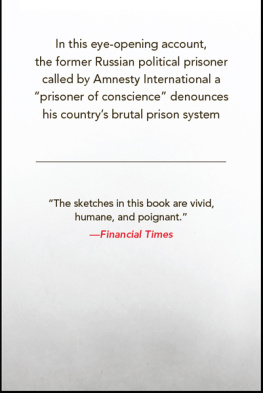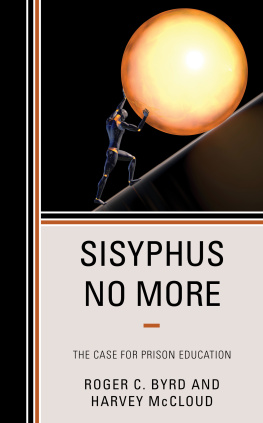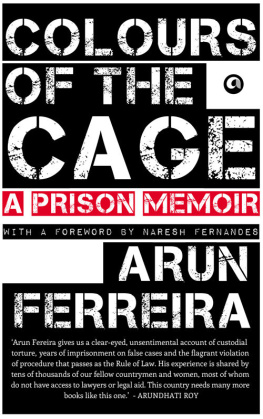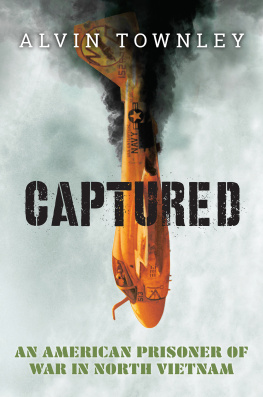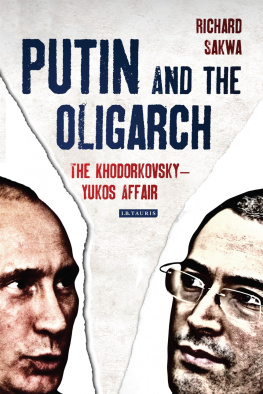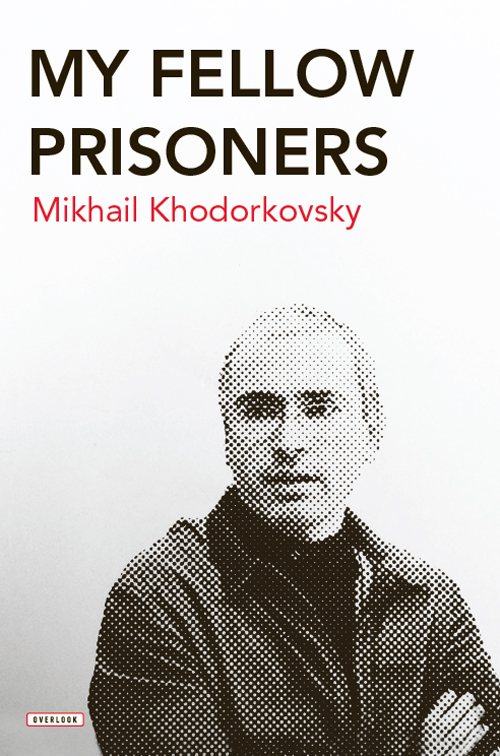The Overlook Press, Peter Mayer Publishers, Inc.
All rights reserved. No part of this publication may be reproduced or transmitted in any form or by any means, electronic or mechanical, including photocopy, recording, or any information storage and retrieval system now known or to be invented, without permission in writing from the publisher, except by a reviewer who wishes to quote brief passages in connection with a review written for inclusion in a magazine, newspaper, or broadcast.
MY FELLOW PRISONERS
Mikhail Khodorkovsky
Mikhail Khodorkovsky was Russias leading businessman and an outspoken Kremlin critic. Under his leadership, the oil company Yukos revived the Russian oil industry, and as the company thrived, he began sponsoring programs to encourage civil society and fight corruption.
When he was arrested at gunpoint in 2003, Khodorkovsky became Russias most famous political prisoner. Sentenced to ten years in a Siberian penal colony on fraud and tax evasion charges, he was put on trial again in 2010 and sentenced to fourteen years, despite the fact that the new charges contradicted the earlier ones.
While imprisoned, Khodorkovsky fought for the rights of his fellow prisoners, going on hunger strike four times. After he was pardoned in 2013, he vowed to continue fighting for prisoners rights, and My Fellow Prisoners is a tribute to that work. A moving portrait of the prisoners Khodorkovsky met, My Fellow Prisoners tells the story of lives destroyed by bureaucratic criminality. It is a passionate call to recognize a human tragedy.
Mikhail Khodorkovsky was Russias leading businessman and an outspoken Kremlin critic. Born in 1963 in Moscow, he founded one of Russias first private banks, Menatep. Group Menatep subsequently acquired a majority interest in the Yukos Oil Company. Under Khodorkovskys leadership, Yukos revived the Russian oil industry, becoming one of the largest oil companies in the country, and the most transparent. He began sponsoring programmes supporting civil society through the Open Russia Foundation, funded several opposition parties and publicly challenged the Kremlin on the issue of corruption.
When he was arrested at gunpoint in 2003 he became Russias most famous political prisoner. In 2005, Khodorkovsky and his business partner Platon Lebedev were convicted on fraud and tax evasion charges, sentenced to ten years and sent to Siberian penal colonies. Yukos was forced into bankruptcy and its assets were appropriated by a state oil company. Before becoming eligible for early release, new embezzlement charges emerged. Despite the fact that the charges contradicted those of the first trial, Khodorkovsky was put on trial again, and, in December 2010, sentenced to fourteen years in prison. The trials were heavily criticized by the international community. Intellectuals such as Elie Wiesel began to campaign for his release. Amnesty International declared Khodorkovsky and Lebedev prisoners of conscience, trapped in a judicial vortex that answers to political not legal considerations.
While imprisoned, Khodorkovsky fought for the rights of his fellow prisoners, going on hunger strike four times. Despite risks to his own safety, Khodorkovsky continued to speak out and write extensively about both the injustices he saw around him and his vision for Russia. He was pardoned on 20 December 2013 and, upon his release, vowed to continue fighting for prisoners rights.
or
How I wanted to write about my impressions of a classical music concert
There were many times in prison, and later in the camp, and then again in prison, and then again in the camp, when I really wanted to listen to a live performance of classical music. Somehow it just never happened; life was a bit crazy, I suppose; there was a lot going on. I also yearned for a situation where I could read, and discuss what I had read with someone a real person instead of having to converse much of the time with a sheet of paper. And now it seems I have absolutely no desire to write about that other life of mine, the prison life.
But a pertinacious editor has asked me to write a foreword to a book that was created in conditions far removed from those in which I find myself today.
This has not proved the easiest of tasks, because, when reading through what Ive written over the previous ten or more years that I was in prison, I involuntarily find myself re-experiencing that life over and over again, a life that once seemed as though it would go on for ever.
On 25 October 2003, the day of my arrest, it would never have occurred to me that details of what I remembered, even the most trivial and mundane, would be of interest to anyone. So, I survived what more is there to say? Besides, as an out-and-out technocrat, not in the least oriented on the humanities, I had always regarded reading as primarily an essential tool for obtaining the information I needed, or for forcing myself to think about something. In fact, even now, hand on heart, I can honestly say to myself: well what kind of writer are you, anyway?!
Do I remember the details of my arrest? Not particularly. Or, rather, I do remember that I was thinking about something completely different from what all the wonderful books they give us to read in school say you should be thinking in such a situation.
I remember I didnt feel anger; I was too stubborn for that. Though it wasnt a question of stubbornness either. Confusion, a sense of uncertainty these are entirely alien feelings for me.
I was thinking about my parents, my wife, my children. I was trying to figure out what would happen to the company. I was definitely thinking about how there might be interrogations using psychotropic drugs, as had happened to my colleague Alexei Pichugin how they would slip something into my food, do a video recording. Which is why at first I tried not to eat, and to drink very carefully, although I wasnt frightened this I can say for sure
It is a strange and wonderful feeling to be able to type out letters and words on a computer, and abandon the habit of jotting things down on little pieces of paper at odd moments of the day or night.
I was often asked and continue to be asked how many times a day, week, month or year I had the opportunity to use the internet, a computer, and other such blessings of technological progress. Well, Ill tell you: for over ten years I never once had such an opportunity! Some of todays opposition leaders were genuinely amazed at how well informed I was in our correspondence; they refused to believe that I didnt have a computer or internet access in my cell. And they continued to be amazed, right up until that moment when they themselves ended up in a cell for a couple of weeks then they understood
What you are now holding in your hands is an attempt to show a world that is beyond the comprehension of most people a world from the past, in which some live in comfort and others do not; a world that coexists in my country with the real world, but where its as though technological progress and the achievements of civilization have never happened. But everybody in Russia irrespective of whether they have read Solzhenitsyn and Shalamov or have no idea who these great writers are knows almost on a genetic level, deep in the subcortex of their brains, the saying

